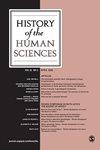Vico and the conspiracy of the sciences
IF 0.5
2区 历史学
Q2 HISTORY & PHILOSOPHY OF SCIENCE
引用次数: 0
Abstract
On 18 October 1708, Giambattista Vico (1668–1744) gave his seventh inaugural oration, De nostri temporis studiorum ratione (De ratione) at the University of Naples. There, he used the term conspirare to propose collaboration among the sciences. An initial study of the historical context, specifically the scholar’s involvement with the Conspiracy of the Prince of Macchia (1701) and the debates on university reform, makes it possible to formulate a hypothesis regarding Vico’s intent and word choice that enriches our understanding of the preserved text. On a personal level, the Neapolitan professor was looking for a modicum of protection from the new authorities, especially the recently named viceroy in audience that day, Cardinal Vicenzo Grimani. On the political plane, along with a surreptitious argument against tyranny, Vico sought to dissuade the new governors from subscribing to the divisive approach embodied in the university policy of the Cartesian and Bourbonic reformers. Direct analysis of the text of De ratione enabled theoretical scrutiny of the frame from which Vico called for more than mere encyclopaedic knowledge. He was setting forth a vision for a conspiratorial project among the sciences based on a broad understanding of rhetoric. His original proposal for inter- and trans-disciplinarity can inform current debates on the same topic.维科与科学的阴谋
1708年10月18日,詹巴蒂斯塔·维科(1668–1744)在那不勒斯大学发表了他的第七次就职演说,即De nostri temporis studiorum rationale(De rationale)。在那里,他用“阴谋”一词来暗示科学之间的合作。对历史背景的初步研究,特别是这位学者参与了马基亚王子的阴谋(1701)和关于大学改革的辩论,使我们有可能就维科的意图和用词提出一个假设,丰富我们对保存文本的理解。就个人而言,这位那不勒斯教授正在寻求新当局的一点保护,尤其是当天听众中最近任命的总督维琴佐·格里马尼枢机主教。在政治层面上,除了一场反对暴政的秘密辩论外,维科还试图劝阻新州长不要赞同笛卡尔和波旁改革者大学政策中体现的分裂方法。对《理性论》文本的直接分析使维科呼吁的不仅仅是百科全书式的知识的框架能够得到理论上的审视。他提出了一个基于对修辞学的广泛理解的科学阴谋项目的愿景。他最初提出的跨学科和跨学科的建议可以为当前关于同一主题的辩论提供信息。
本文章由计算机程序翻译,如有差异,请以英文原文为准。
求助全文
约1分钟内获得全文
求助全文
来源期刊

History of the Human Sciences
综合性期刊-科学史与科学哲学
CiteScore
1.60
自引率
11.10%
发文量
31
审稿时长
>12 weeks
期刊介绍:
History of the Human Sciences aims to expand our understanding of the human world through a broad interdisciplinary approach. The journal will bring you critical articles from sociology, psychology, anthropology and politics, and link their interests with those of philosophy, literary criticism, art history, linguistics, psychoanalysis, aesthetics and law.
 求助内容:
求助内容: 应助结果提醒方式:
应助结果提醒方式:


